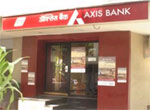Strike cripples bank operations, but ATMs ‘flush with money’
06 Aug 2009
Employees of Indian state-run banks, including the country's biggest lender, State Bank of India, began a two-day strike today for higher wages and pension. Banking operations across the country were impacted severely, but fortunately for retail customers, ATMs and major private sector banks continued functioning.
 However, reports from various urban centres, including the chief metros of Mumbai, Delhi, Kolkata and Chennai as well as smaller centres, said cheque clearing operations, foreign currency and money market operations, and government transactions by the public sector banks were crippled.
However, reports from various urban centres, including the chief metros of Mumbai, Delhi, Kolkata and Chennai as well as smaller centres, said cheque clearing operations, foreign currency and money market operations, and government transactions by the public sector banks were crippled.
Led by the United Forum of Bank Unions, about 900,000 employees in public sector banks and older-generation private sector banks went on a strike after talks with the Indian Banks' Association, the apex body representing bank management, failed on Tuesday.
''The strike is total and has affected cash transactions,'' C H Venkatachalam, convenor of the United Forum of Bank Union, said. The union members will meet again on 11 August to plan the future course of action, he added.
The strike looks set to continue on Friday. "ATMs are full with cash and I hope common people would not be affected for these two days," said M D Mallya, chairman and managing director of state-run Bank of Baroda. There are more than 40,000 ATMs in the country.
But the strike did have a severe impact on larger banking transactions, as public sector banks account for about 70 per cent of the banking business in the country. Also, employees of private sector banks like Federal Bank, Karnataka Bank, South Indian Bank, ING Vysya Bank and Lakshmi Vilas Bank participated in the strike because some of their staff are governed by the wage settlement process with the Indian Banks Association.


















